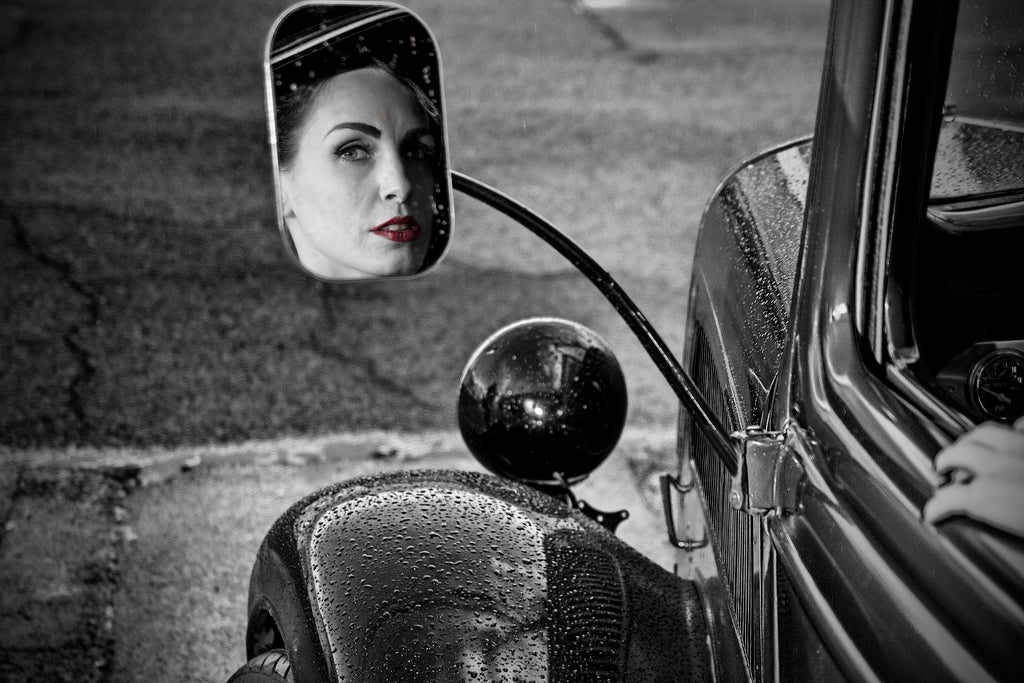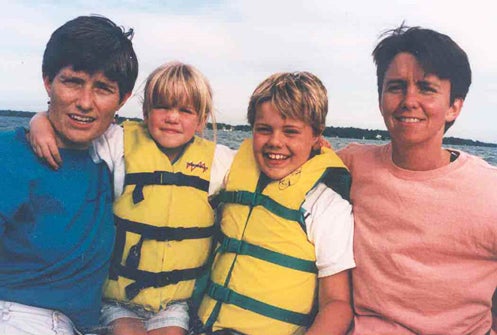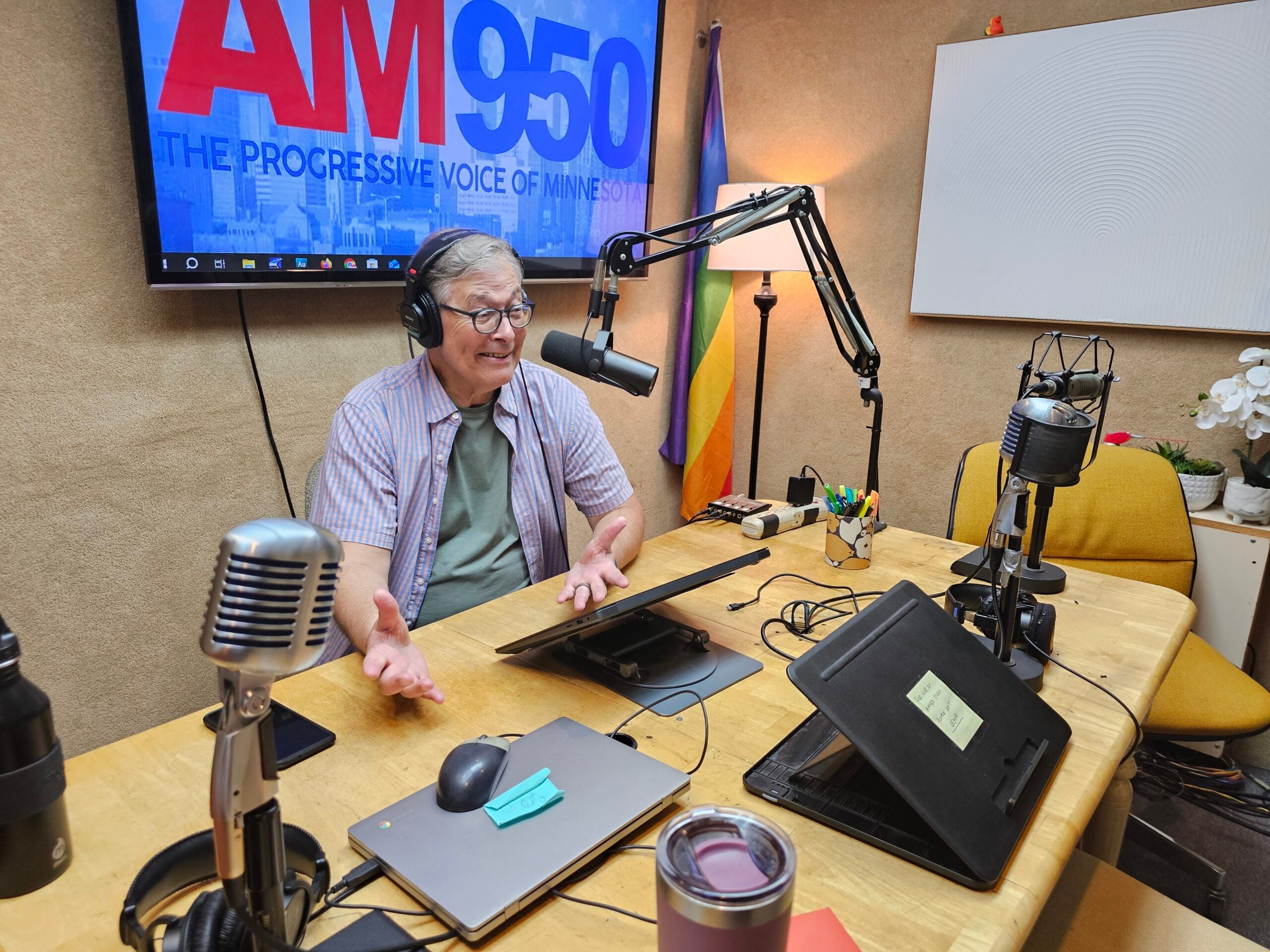Megan Abbott talks about her women-centered crime fiction and writing for the HBO series, “The Deuce.” Guy Branum shares how art shaped his life as a stand-up comedian. And Benjamin Errett explains how our five senses of taste might predict our cultural tastes.
Featured in this Show
-
Crime Novelist Megan Abbott's Strong Women
Author Megan Abbott loves film noir. Her favorite all-time film in the genre is the Humphrey Bogart-fronted, “In a Lonely Place.”
“I like gritty film noir too, but I always kind of like the ones that are steeped in glamour. It’s a world of extremes and there’s something very heady about that,” she told WPR’s “BETA.” “It is also a doomed romance and I’m a sucker for those.”
This love affair with film noir serves as a prerequisite for being a successful, hard-boiled crime fiction author.
“(Noir) just being all about desire and aggression and regret and all the kind of primal urges that crime fiction is most concerned with too,” Abbott said.
So it’s no surprise that a bulk of Abbott’s recent output is right in this wheelhouse. Abbott is the author of several acclaimed crime fiction novels and her latest is “Give Me Your Hand.” She is also a staff writer for HBO’s 1970’s crime and pornography series, “The Deuce.”
“Give Me Your Hand” is a suspenseful story surrounding “frenemies” Kit and Diane and a dark secret from their past that haunts their future as they both compete for a pivotal position in a scientific research group.
Abbott’s core strength of representing and featuring women in crime fiction is at the heart of the novel as she persuasively renders Kit and Diane’s lifelong competitive connection.
“There are often these relationships among women that are part friendship, part competitive relationships,” Abbott said. “We don’t talk about it that much, but it kind of drives us. So, I kind of wanted to get into it and look at it from the inside out.”
Abbott’s work is in the same vein of the work of Dorothy B. Hughes who wrote “In a Lonely Place” and of “Strangers On a Train” and “The Talented Mr. Ripley” author Patricia Highsmith.
“(She’s) the goddess of the crime fiction world in many ways and someone willing to go there,” Abbott said. “They’re less discussed, those women, because it’s historically a male-dominated genre but I think they’re all pretty wonderful.”
However, it was another famous female crime novelist, Laura Lippman, that connected Abbott to the HBO series, “The Deuce.”
Set in Times Square during the 1970s, the show depicts the rise of the pornography industry through the lens of several loosely interconnected locals. Many of them are women, including the prostitutes who worked the Times Square grid, known colloquially as the “Deuce.” Lippman’s husband, David Simon, and Abbott’s fellow crime fiction author, George Pelecanos, created the show for HBO.
“It is in large part about the women working in pornography so it was really important to David and George that female voices be represented in the room.”
It has been quite a change for Abbott to toggle from the independent endeavor of novel writing to the more communal (and argumentative) writer’s room of a drama series.
“It’s been an exciting transition, but definitely one that’s made me call on all kinds of resources inside,” she said. “They’re really very different notions of storytelling, beyond the collaborative. There’s something very intimate about novels. You can really get in the reader’s head in a way that TV would never have.”
Abbott wanted to make sure the women on the show reflected a range of experiences within the budding world of pornography and in the prostitution circuit.
“We wanted them to have a multiplicity of responses,” Abbott said. “And, we also wanted them not just to be victims, but some of them behave badly themselves and make poor choices. We wanted all of that.”
All of that experience inside the television writing room will come in handy for Abbott moving forward. In addition to penning a TV pilot adaptation for her 2012 novel “Dare Me,” the cable network AMC has just optioned “Give Me Your Hand” for a new television series.
“As a ‘Mad Men’ and ‘Breaking Bad’ lover, I’m thrilled it’s in AMC’s hands now,” she said.
-
Comedian Guy Branum Is A Goddess
In Greek mythology, Leto is the goddess of motherhood and best known as the mother of Apollo and Artemis with Zeus. Escaping Hera’s — Zeus’ wife — wrath, Leto wandered looking for a place to bare her children. While she rested, peasants mocked Leto for being an unwed mother. At that moment, Leto remembered she was a goddess and rose up. She wreaked havoc on the peasants and created her place in the world.
It is this myth, and specifically that line — “she remembered she was a goddess” — that was life changing for comedian Guy Branum. He reminds himself of it when inspiration is needed.
“For me, life has been a long series of events where I end up feeling kind of powerless or alone or not being able to really do anything to fix my situation. Then I remembered I was a goddess and I couldn’t necessarily fix my situation, but I could at least make some trouble,” he told WPR’s “BETA.”
“Even if I wasn’t making it rain or turning people into frogs, I was at least doing something to take some control of the world around me back,” he said.
It’s why Branum titled his memoir, “My Life as a Goddess: A Memoir Through (Un)Popular Culture” as a reminder to never forget who you are.
As a bookish kid, Branum has had several similar revelations while reading or consuming art. He admits it is tough to frame a story “about you being changed by art.”
“Look, I’ve made some terrible choices and made some real messes in my actual life, but it’s also about the works of art that pushed me into those terrible choices or taught me how to get out of them,” Branum said.
Branum’s passion for the arts and pop culture stems from his childhood. He grew up in a rural farm town in northern California. He offers that rural farm communities in California do not have the same vibe as similar towns in the Midwest and that they lacked the cultural touchstones.
“I went to towns in Minnesota and Wisconsin that were tiny, but they had community theaters, they had bands. In northern California, there was none of that stuff,” Branum said. “In this place that was deeply anti-intellectual, very working class, to me it was just amazing that there was PBS and books and encyclopedias that could show me other places.”
Branum began watching stand-up comedy in the boom of the 1980s. His favorite stand-up performance was Eddie Murphy’s “Delirious.” Branum was enthralled by Murphy’s “sense of power, agency and swagger.”
The performance inspired Branum to pursue comedy, but it also ignited a deep self-reflection. As a gay man, Branum realized that “the first five minutes or so of Eddie Murphy ‘Delerious’ is him just talking about how disgusting gay people are.”
“It was a fascinating moment to realize that this thing that really did make me fall in love with stand-up and in many ways defines the style of stand-up that I do today also was full of homophobic messages that really informed my understanding of myself as a gay man,” Branum said. “It was a really hard process to try to reconcile those two things. To say that this piece of art was very valuable to me and very damaging to me at the same time.”
Branum doesn’t have the answer that explains the cognitive dissonance that occurs when someone from an underrepresented group enjoys the work of someone that’s positioned to repress them. But it does not stop him from trying.
In November 2017, Branum penned an essay discussing the fallout of the Louis C.K. sexual harassment saga. In it, he argued that as long as the media representation of comics — best depicted in C.K.’s FX show, “Louie” — was of an exclusive boy’s club, this culture of harassment remained possible.
“I was essentially saying that as long as we have these deeply male heterosexual power structures within our business, it’s going to be easy for people to do things like what Louis C.K. did,” Branum said.
Branum states that the career of a stand-up comic is unstructured and that there is no human resources department. He says that the community watches over itself and that can be problematic for underrepresented groups in the comedy world.
“Having the people in charge be all straight guys means women, trans people, queer people; there’s nobody looking out for us,” he said.
Branum hopes his memoir can help too.
“I hope that when people get done with it they look at their own lives a little bit differently and they think about the struggles that they have had as powers as much as struggles,” he said.
-
How Your Sense of Taste Can Influence Your Cultural Tastes
Have you read any bitter books lately, watched any salty television or listened to any really great umami music?
What exactly do we mean? Benjamin Errett is the author of “Elements of Taste: Understanding What We Like and Why.” He’s come up with a new way to figure out what entertainment you should be consuming based on your taste buds.
Errett was researching taste in an effort to find a way to get beyond good taste, bad taste, highbrow and lowbrow. He was looking for something that would help people get a better handle on the kinds of books, movies, music and TV shows they liked and how they could find more of what they liked.
In that search, Errett discovered a 2011 paper called “Listening, Watching, and Reading: The Structure and Correlates of Entertainment Preferences” by Peter Rentfrow, Lewis Goldberg, and Ran Zilca.
“(The researchers) looked at a whole bunch of genres on Amazon, on IMDb, at Barnes and Nobles, and broke them down into something like 110 categories,” Errett told WPR’s “BETA.”
They came up with 22 music genres, 34 book and magazine genres, 18 film genres and 34 television genres. The researchers then put these lists in front of test groups and asked them to declare their preferences on a seven-point scale. Based on their findings, the researchers boiled them down to five basic categories: communal; dark; thrilling; aesthetic; and cerebral.
Upon reviewing their research, Errett had his epiphany.
“And so then I was looking at this research — which I found fascinating — and I thought five basic kinds of taste. ‘Wait a minute! We have five basic kinds of taste on the tongue!’ You have your sweet, sour, salty, bitter and umami. So maybe there’s something there.
“Basically, I teased this out and pushed this idea to its logical limits and got to the point where I thought you can basically say that there are sweet books and sour movies and salty songs and bitter poetry and umami documentaries,” Errett said. “And you can take things and see how they might recombine all of those things. Just as lots of foods are a little bit sweet, a little bit sour, a little bit salty — same with culture.”
So how does Errett define the taste of “sweet” culture?
“So sweetness is my first taste because it’s the first taste that every child likes. You don’t take candy from a baby for a reason. It’s sort of the taste of cultural comfort; it’s the taste that tells you everything’s going to be okay,” he said. “Most pop songs are sweet, romantic comedies, sitcoms, things that have happy endings and reassure you. And it’s sort of cultural comfort food like ice cream.”
Errett said he thinks that sweetness is the prevalent taste in all culture because often when we turn to entertainment, we don’t want to be challenged, we want to be comforted.
“Sometimes too much so, so there’s way too much sweet stuff and movies always end the way you expect them to. The hero always wins,” he said.
So does Errett consider the band Coldplay to be an example of this sweet culture?
“They’re very sweet and they’re very communal. They really hit that emotional note. People will start crying at a Coldplay concert but there’s no definitive reason why. They’re not talking about anything specific, it’s just sort of general emotional notes that they’re hitting,” Errett said.
According to Errett, sour culture is the taste of rebellion.
An example is BLARPing, which may sound like a sound effect used by Mad Magazine cartoonist Don Martin. But “BLARPing” is actually “Business Live-Action Role-Play.” It was created by an Australian teenager named Thomas Oscar.
In 2013, Oscar started a Facebook group for a fictional company called Stackswell & Co. Members of the group pretended that they worked for the company and sent each other pointless bureaucratic emails about synergy and jammed photocopiers in a playfully subversive parody of real-life office life. But when some real-life office workers started “working” for the fictional company, the teens moved on to greener pastures.
As of this writing, we’re not sure if they’ve moved on to fictional companies or to real companies. Maybe we should check LinkedIn to find out.
Errett classifies umami as the “indescribable” taste. He says that it’s the taste that we crave but can’t quite identify. He points to the Amazon Video series, “The Marvelous Mrs. Maisel,” as an example of umami culture.
“(Show creator Amy Sherman-Palladino) creates this world, whether it’s accurate or not is really beside the point, of what like a 1950s New York comedy scene would be like. And you just want to be in that world and she gives you everything you need to be in there. And the references go fast and it appeals to that part of our brains that just wants more, more, more information.”
Episode Credits
- Doug Gordon Host
- Adam Friedrich Producer
- Doug Gordon Producer
- Steve Gotcher Technical Director
- Megan Abbott Guest
- Guy Branum Guest
- Benjamin Errett Guest
Wisconsin Public Radio, © Copyright 2026, Board of Regents of the University of Wisconsin System and Wisconsin Educational Communications Board.



